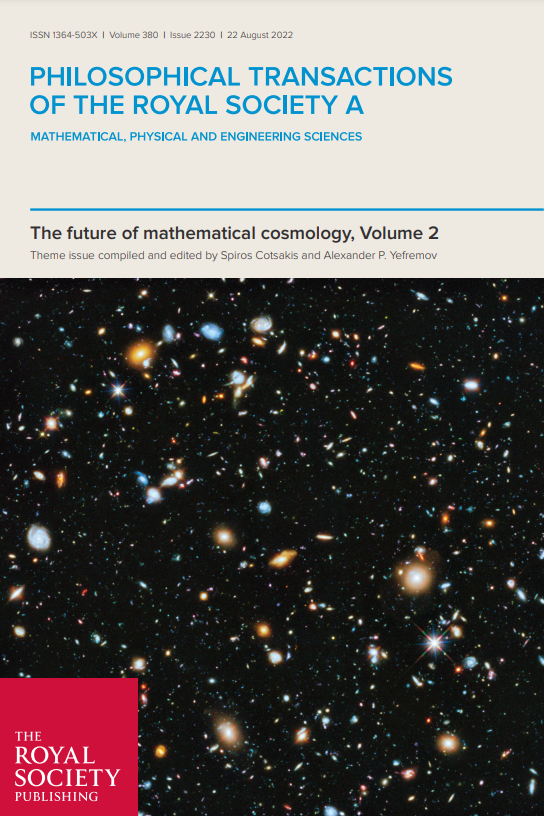RUDN astrophysicists prepare the second volume of the special issue 'The Future of Mathematical Cosmology' in the Proceedings of the British Academy of Sciences

The first volume of this special issue was published in March 2022. The second was published online more recently in July. Professor Kotsakis and Professor Efremov wrote the preface to both volumes of the special issue and also published in it the seminal review article "100 years of mathematical cosmology: Models, theories and problems, Parts A, B" in two parts ("100 years of mathematical cosmology: Models, theories and problems, Parts A, B").
At their invitation, leading international experts in theoretical physics and cosmology have contributed to the special issue by publishing 20 outstanding scientific articles in the journal on the structure and evolution of the universe.
The authors of the second edition include well-known physicists and mathematicians:
- Robert Robert Brandberger (Switzerland-Canada; McGill University, Montreal)
- Maurizio Gasperini (Italy, National Institute of Nuclear Physics, Bari)
- Joat Sola Peracaula (Spain, University of Barcelona)
Abstract for the second volume of the special issue "The Future of Mathematical Cosmology":
What are the main achievements in theoretical cosmology over the last 100 years? What is its current state and prospects? What do we know about the Big Bang, dark energy, the future of the universe, the shape of space-time, the multiverse, and the quantum nature of space?
Mathematical cosmology was born in 1917, when Albert Einstein showed us how to construct entire universes according to the laws of physics. Since then, it has developed into a fascinating field, providing explanations for new data and observations. This theme issue is the first devoted exclusively to the complex nature of the universe and provides a clear blueprint for future developments in this fundamental area of modern science.
A printed version of the second volume of the special issue "The future of mathematical cosmology" will be published on 22 August. Information is available from the Philosophical Transactions of the Royal Society, https://royalsocietypublishing.org/toc/rsta/2022/380/223.
For reference
Philosophical Transactions of the Royal Society is the oldest scientific journal in the world. It has been published continuously for over 350 years, since 1665. The great physicists and mathematicians Newton, Boyle, Huygens, and Leibniz published in it. It is only possible to publish an article in this journal by invitation from the British Academy of Sciences. The journal is in the A series, quartile Q1.
Sergey Ivanov, a scientist from St. Petersburg, became the first winner of the RUDN University International Prize for scientific achievements and merits in the field of mathematics in the amount of 5 million rubles.
Egyptian scientist Abdelraouf Masoud Ali, associate professor at the Department of Environmental Management, Institute of Environmental Engineering, has been awarded the 2024 Egyptian State Incentive Prize in Agricultural Sciences.
Inventors from 26 countries and 35 regions of Russia presented more than 500 projects at the XVIII Moscow International Salon of Inventions and Innovative Technologies “Archimedes”. 340 projects belong to Russian participants, and their foreign colleagues — 215. RUDN University initiatives were awarded two gold medals.
Sergey Ivanov, a scientist from St. Petersburg, became the first winner of the RUDN University International Prize for scientific achievements and merits in the field of mathematics in the amount of 5 million rubles.
Egyptian scientist Abdelraouf Masoud Ali, associate professor at the Department of Environmental Management, Institute of Environmental Engineering, has been awarded the 2024 Egyptian State Incentive Prize in Agricultural Sciences.
Inventors from 26 countries and 35 regions of Russia presented more than 500 projects at the XVIII Moscow International Salon of Inventions and Innovative Technologies “Archimedes”. 340 projects belong to Russian participants, and their foreign colleagues — 215. RUDN University initiatives were awarded two gold medals.